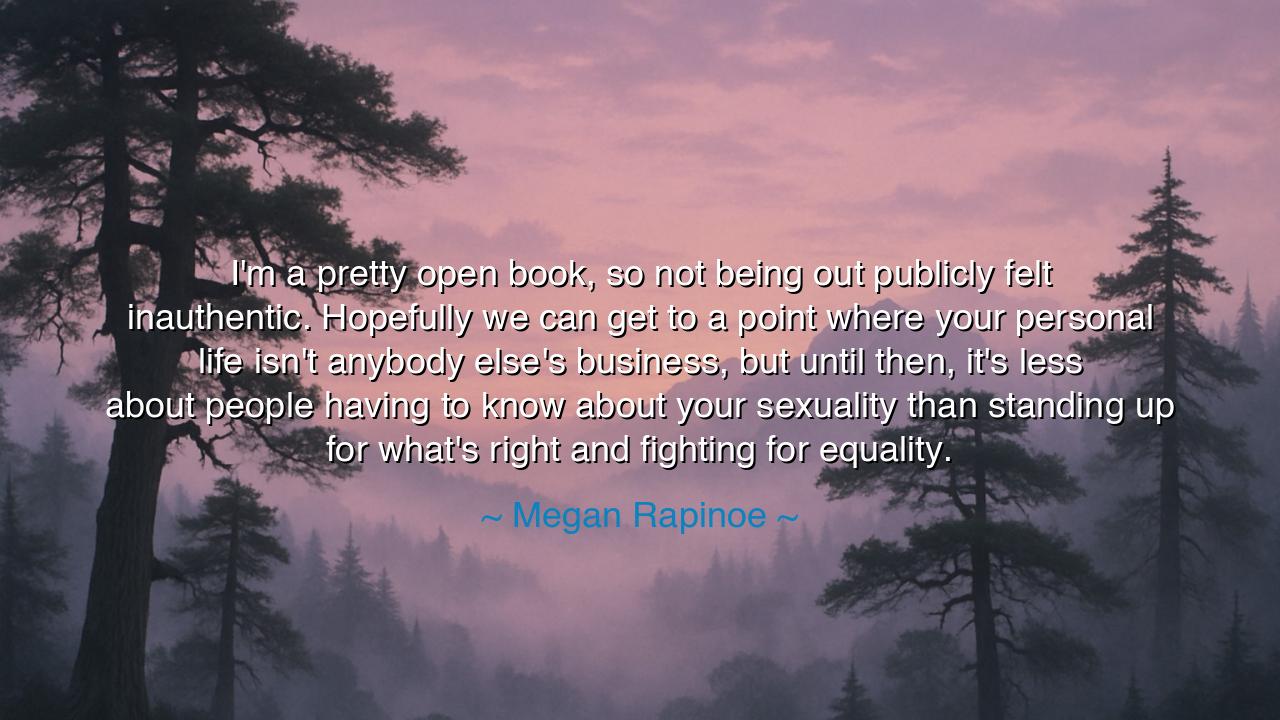
I'm a pretty open book, so not being out publicly felt
I'm a pretty open book, so not being out publicly felt inauthentic. Hopefully we can get to a point where your personal life isn't anybody else's business, but until then, it's less about people having to know about your sexuality than standing up for what's right and fighting for equality.






O Children of the Future, gather close and listen to the words of Megan Rapinoe, whose voice carries the weight of truth and courage. She says, "I'm a pretty open book, so not being out publicly felt inauthentic. Hopefully we can get to a point where your personal life isn't anybody else's business, but until then, it's less about people having to know about your sexuality than standing up for what's right and fighting for equality." In these words, Rapinoe speaks of a deeper truth—that the journey toward personal authenticity and freedom is often intertwined with the struggle for justice. She acknowledges that to be true to oneself in a world that still judges people based on their sexuality is both a personal and a societal act. It is a call to embrace one's identity fully, while also recognizing the responsibility to fight for the equality of all people, regardless of their sexual orientation.
In the ancient world, O Children, to be true to one’s identity was often a dangerous pursuit. The Greeks themselves, despite their advancements in philosophy, art, and democracy, often viewed sexuality in terms of hierarchies—with male love and relationships carrying a different weight than those involving women. Plato, in his Symposium, celebrated the bond between men, but the roles that women played in society were often reduced to being mere companions or property. The notion of being open about one’s identity—sexual or otherwise—was not one that was easily embraced. The world was steeped in traditional roles that defined the individual in terms of family, social class, and duty. Rapinoe’s statement reminds us that even in times of great cultural advancement, the battle for equality often requires breaking free from these ancient constraints.
In a more modern context, O Children, the fight for authenticity and equality has become more visible. Consider the life of Harvey Milk, the first openly gay elected official in California. His journey to public office was not just a personal achievement, but a radical act of courage. Milk understood that to live authentically was to put oneself at risk for the greater good of the LGBT community. In his speeches, Milk often said, "Hope will never be silent," emphasizing the importance of being open, not just for oneself, but for the benefit of those who felt silenced by societal oppression. Rapinoe’s words resonate with the legacy of Milk, for both understood that the personal act of coming out was not just about the individual but about standing up for what was right and fighting for the freedom of others to be true to their own identity.
As Rapinoe wisely points out, the struggle for equality is not simply about one’s sexuality, but about creating a world where the personal lives of all individuals are respected and valued. The fight for equality does not end with individual identity; it extends to societal structures that still perpetuate discrimination. The modern struggle for the LGBTQ+ community has been an ongoing battle for recognition—not just in the laws of the land, but in the hearts and minds of the people. Rapinoe suggests that it is not enough to simply live as one truly is; we must stand up for justice for all, and fight against the systems that seek to oppress and marginalize.
Reflect, O Children, on the Stonewall Riots of 1969, a pivotal moment in the fight for LGBTQ+ rights. When the Stonewall Inn was raided by the police, it was not just a response to one event, but a culmination of years of oppression and discrimination. The riots were a call for equality and freedom, and they sparked a movement that would bring the LGBTQ+ community into the light. The individuals who fought back that night understood that being true to oneself required not just silence, but action. Rapinoe, in her statement, calls us to recognize that the personal journey of coming out is often a public act that must be tied to the larger struggle for equality—not just for oneself, but for the collective well-being of all.
The lesson, O Children, is this: authenticity is not merely the right to be who you are; it is the courage to stand for what is right, to fight for the equality of all people, and to reject the forces that seek to define you by labels or categories. Megan Rapinoe teaches us that the fight for equality is not a personal struggle alone—it is a battle for the freedom of all people to live their lives openly, without fear of judgment or persecution. Equality is not a gift; it is a fight, and we must be brave enough to take part in that fight, for it is the true foundation of a just and fair society.
And so, O Children, what actions must you take? Do not wait for others to define you; stand tall in your identity, and live with the knowledge that your authenticity is a right. Fight not just for your freedom, but for the freedom of all those who are oppressed or marginalized. Speak for those who cannot speak, stand up for what is right, and challenge the systems that seek to divide. For it is through our collective action, our commitment to justice, and our courage to be authentic that we will create a world where every individual, regardless of their sexuality or identity, can live freely and without fear. The path to equality is not an easy one, but it is the path that leads us to a future of true peace and dignity for all.






AAdministratorAdministrator
Welcome, honored guests. Please leave a comment, we will respond soon